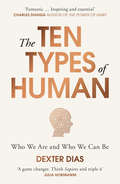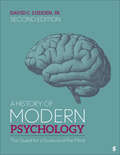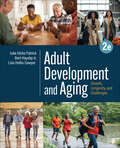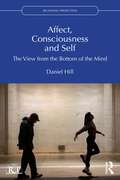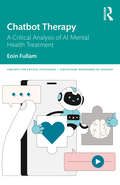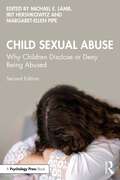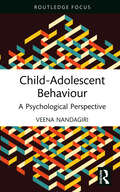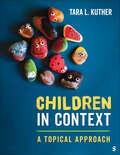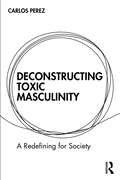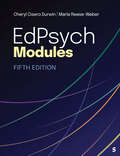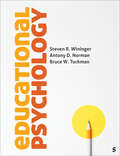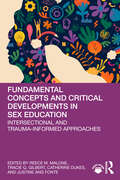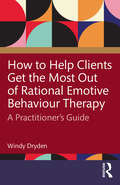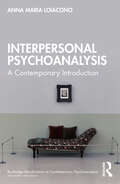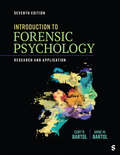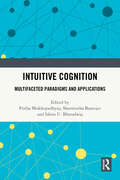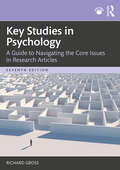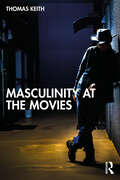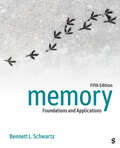- Table View
- List View
The Ten Types of Human: A New Understanding of Who We Are, and Who We Can Be
by Dexter DiasThe inspiration behind the hit podcast THE 100 TYPES OF HUMAN with DEXTER DIAS and BBC 5 Live host NIHAL ARTHANAYAKE'This book is the one. Think Sapiens and triple it.' - Julia Hobsbawm, author of Fully Connected_______________________________We all have ten types of human in our head.They're the people we become when we face life's most difficult decisions. We want to believe there are things we would always do - or things we never would. But how can we be sure? What are our limits? Do we have limits? The Ten Types of Human is a pioneering examination of human nature. It looks at the best and worst that human beings are capable of, and asks why. It explores the frontiers of the human experience, uncovering the forces that shape our thoughts and actions in extreme situations.From courtrooms to civil wars, from Columbus to child soldiers, Dexter Dias takes us on a globe-spanning journey in search of answers, touching on the lives of some truly exceptional people.Combining cutting-edge neuroscience, social psychology and human rights research, The Ten Types of Human is a provocative map to our hidden selves. It provides a new understanding of who we are - and who we can be._______________________________'The Ten Types of Human is a fantastic piece of non-fiction, mixing astonishing real-life cases with the latest scientific research to provide a guide to who we really are. It's inspiring and essential.' - Charles Duhigg, author of The Power of Habit'I emerged from this book feeling better about almost everything... a mosaic of faces building into this extraordinary portrait of our species.' - Guardian'Uplifting and indispensable.' - Howard Cunnell _______________________________What readers are saying about 'the most important book in years':'utterly compelling...this one comes with a warning - only pick it up if you can risk not putting it down' - Wendy Heydorn on Amazon, 5 stars'one of the most remarkable books I've read... I can genuinely say that it has changed the way I view the world' - David Jones on Amazon, 5 stars'Essential reading for anyone wishing to understand the human condition... a thrilling and beautifully crafted book' - Wasim on Amazon, 5 stars'This is the most important book I have read in years' - Natasha Geary on Amazon, 5 stars'an important and fascinating read... It will keep you glued to the page' - Hilary Burrage on Amazon, 5 stars'a journey that I will never forget, will always be grateful for, and I hope will help me question who I am... a work of genius' - Louise on Amazon, 5 stars'This is a magnificent book that will capture the interest of every type of reader... one of those rare and special books that demand rereading' - Amelia on Amazon, 5 stars 'I simply couldn't put it down... one of the most significant books of our time' - Jocelyne Quennell on Amazon, 5 stars'Read The Ten Types of Human and be prepared to fall in love' - Helen Fospero on Amazon, 5 stars
A History of Modern Psychology: The Quest for a Science of the Mind
by David LuddenA History of Modern Psychology: The Quest for a Science of the Mind describes the evolution of psychology into the twenty-first century with coverage of recent events and findings that transform our understanding of the past. With a topical approach that presents key thinkers within the context of schools of thought, students are able to see how philosophers, researchers, and academics influenced one another to create the rich and diverse landscape of modern psychology in a global context. In the new Second Edition, the author expands coverage of unsung pioneers (philosopher Al-Balkhi, zoologist Charles Henry Turner, psychiatrist Grunya Sukhareva, and others), revisits the legacy of Francis Galton, explores the "Vygotsky boom," and includes new discussion of the impact of Philip Zimbardo′s Stanford Prison Experiment. Through detailed timelines and features such as "Looking Back" and "Looking Ahead," Ludden gives students a deeper appreciation for the transference of knowledge that shaped the field.
A History of Modern Psychology: The Quest for a Science of the Mind
by David LuddenA History of Modern Psychology: The Quest for a Science of the Mind describes the evolution of psychology into the twenty-first century with coverage of recent events and findings that transform our understanding of the past. With a topical approach that presents key thinkers within the context of schools of thought, students are able to see how philosophers, researchers, and academics influenced one another to create the rich and diverse landscape of modern psychology in a global context. In the new Second Edition, the author expands coverage of unsung pioneers (philosopher Al-Balkhi, zoologist Charles Henry Turner, psychiatrist Grunya Sukhareva, and others), revisits the legacy of Francis Galton, explores the "Vygotsky boom," and includes new discussion of the impact of Philip Zimbardo′s Stanford Prison Experiment. Through detailed timelines and features such as "Looking Back" and "Looking Ahead," Ludden gives students a deeper appreciation for the transference of knowledge that shaped the field.
Adult Development and Aging: Growth, Longevity, and Challenges
by Lisa Hollis-Sawyer Bert Hayslip Julie Hicks PatrickTopically organized, Adult Development and Aging: Growth, Longevity and Challenges provides students with a comprehensive understanding of the aging process in adulthood from multiple perspectives. In this Second Edition, Julie Hicks Patrick, Bert Hayslip, and Lisa Hollis-Sawyer use principles of lifespan development to show readers the directionality of changes in early, middle, and late adulthood. Within its framework of scientific literacy, the text charts four key themes to guide learners: a focus on aging as development; a global perspective on contexts; a vibrant, integrated approach to diverse coverage; and psychological science that translates into real-life experiences. A final chapter focuses on ways to improve the experience of aging for all adults.
Affect, Consciousness and Self: The View from the Bottom of the Mind (Relational Perspectives Book Series)
by Daniel HillThis book argues that mental life is organized by and around affect. It proposes a clinical model for understanding how affect influences states of consciousness and self. It illustrates how, from moment to moment, affect determines the world we know, how we are disposed to being in it, and our capacity to function in it.After introducing consciousness and self as features of mind that have posed daunting problems for philosophy, neurology, and psychoanalysis, subsequent chapters propose a model for understanding them at the clinical level. Initial chapters are devoted to the influence of affect on the structure and dynamics of normal waking consciousness and on the self’s capacity to act agentically, to relate intersubjectively, and to develop itself. Final chapters discuss disordered states of consciousness and impeded self‑functioning, due to affect dysregulation and what all this looks like in patients with preoccupied and avoidant attachment patterns.Drawing on psychoanalysis, attachment theory, interpersonal and affective neurobiology, and traumatology, this book offers a fresh perspective on the importance of affect for psychoanalysts and psychodynamic psychotherapists.
Chatbot Therapy: A Critical Analysis of AI Mental Health Treatment (Concepts for Critical Psychology)
by Eoin FullamChatbot Therapy: A Critical Analysis of AI Mental Health Treatment examines automated mental health therapy in the form of therapy chatbots, taking a critical analysis of this new technology.Drawing on historical and emerging scholarship on critical theory, science and technology studies, and critical psychology, this project investigates the social life of mental health therapy applications. The book unearths the assumptions about subjectivity, consciousness, and mental health that underpin these applications, looking predominantly at Wysa and Woebot, but also at other chatbot and non-chatbot mental health applications. It explores the historical emergence of this technology, the technical and design aspects of chatbot therapy apps, the therapeutic methods employed, and the economic context within which therapy chatbots have developed. It centres around the questions of what it means to automate mental health treatment and of how automated interventions alter our understanding of mental suffering and well-being.This highly topical and interdisciplinary study will be of great interest to postgraduate students and researchers in the fields of critical psychology, mental health, cognitive science, artificial intelligence, science and technology studies, and critical theory. It will also be relevant reading for mental health professionals.
Child Sexual Abuse: Why Children Disclose or Deny Being Abused
by Michael E. Lamb Irit Hershkowitz Margaret-Ellen PipeThis fully revised volume provides a rigorous assessment of the latest research relating to the disclosure of childhood sexual abuse, along with the practical and policy implications of the findings.Leading researchers and practitioners from diverse and international backgrounds offer critical commentary on these findings gathered from both field and laboratory research. Building on the first edition, this book presents the research from the past twenty years on why delayed disclosure or denial is so common and what we can do about it. Chapters focus on field research interviewing reluctant children, including suspected victims of sexual abuse and other crimes, victims of trafficking, as well as young, suspected perpetrators of sexual abuse. Adding emphasis on research‑based methods for overcoming reluctance, it also explores the different dynamics and circumstances which affect disclosure patterns and the ways in which interviewers can facilitate disclosures.Child Sexual Abuse is for researchers and practitioners from child, forensic, and clinical psychology, social work, and all legal professionals who need to understand this crime. It will also be of interest to trainee social workers specializing in child welfare and intervention.
Child-Adolescent Behaviour: A Psychological Perspective
by Veena NandagiriThis book briefly outlines psychological perspectives of the values, attitudes and behaviour of parents in influencing a child’s personality. The volume discusses important factors and family surroundings that influence a growing child’s development and various techniques that parents and teachers may use to inculcate children’s growth and well-being. Various discipline techniques that parents can use with the child and ways in which they can enhance their child’s creativity and achievement levels are explained. It also discusses the causes, signs and types of learning disabilities, such as dyslexia, dysgraphia, dyscalculia and developmental coordination disorder (dyspraxia), and behaviour disorders like anxiety disorders, conduct disorders, oppositional defiant disorder, attention-deficit hyperactivity disorder (ADHD), aggressive behaviour in children and the speech disorder stuttering. The volume gives an elaborate understanding of the diverse changes, conflicts, emotional turmoil and identity crises that adolescent children go through and how parents and teachers can help them to handle this transitional stage.This book will be of interest to psychologists, parents, students and teachers of psychology and scholars of child development, as well as professionals involved in working with children and adolescents, such as teachers, counsellors, doctors, nurses and social workers.
Children in Context: A Topical Approach
by Tara L. KutherIn the topically organized Children in Context, award-winning author Tara L. Kuther emphasizes three core themes of child development: the importance of context, the relevance of research, and the applied value of developmental science. By examining child development through real-life contexts—such as gender, race and ethnicity, and socioeconomic status—Kuther engages students with up-to-date data, relatable examples, and cross-cultural stories, offering insights that directly connect to their own experiences and future professions.
Children in Context: A Topical Approach
by Tara L. KutherIn the topically organized Children in Context, award-winning author Tara L. Kuther emphasizes three core themes of child development: the importance of context, the relevance of research, and the applied value of developmental science. By examining child development through real-life contexts—such as gender, race and ethnicity, and socioeconomic status—Kuther engages students with up-to-date data, relatable examples, and cross-cultural stories, offering insights that directly connect to their own experiences and future professions.
Deconstructing Toxic Masculinity: A Redefining for Society
by Carlos PerezThis accessible book explores toxic masculinity, looking at how to define it, and how we can and should challenge its spread. This book draws on Derrida’s deconstruction, using the philosophical lens to deconstruct what toxic masculinity means and to better understand its significance for our society. It focuses on how harmful aspects of masculinity spread, infiltrate, and intoxicate our societies and how existing structures allow aspects of harmful masculinity to become toxic. This book also features discussions and analysis of participants’ lived experiences of masculinities, alongside the author’s reflections. It explores the relevance of toxic masculinity in work environments, politics, relationships, and gender roles and seeks to challenge and mitigate its damages for everyone. Encouraging critical thinking and understanding of healthier ways of being for all, this timely book will be of interest to therapists, counselors, teachers, and practitioners of family studies. It will also be useful reading for students in the fields of psychology, gender studies, sociology, and related fields.
EdPsych Modules
by Cheryl Cisero Durwin Marla J. Reese-WeberEdPsych Modules by Cheryl Cisero Durwin and Marla Reese-Weber uses an innovative modular approach, integrating case studies drawn from real-life classroom situations to address the challenge of effectively connecting theory and research to practice. The text features succinct, stand-alone modules organized into themed units, offering the flexibility to tailor content to the specific needs of a course. Each unit opens with case studies written for early childhood, elementary, middle, and secondary classrooms, showing students the dynamics influencing the future students they plan to teach. All 25 modules highlight diversity, emphasizing how psychological factors adapt and change based on external influences such as sex, gender, race, language, disability status, and socioeconomic background. The Fifth Edition includes over seven hundred new references across all 25 modules, with thorough coverage of the latest developments in education, such as artificial intelligence, virtual reality, the latest neuroscience research, and updated coverage of disabilities.
EdPsych Modules
by Cheryl Cisero Durwin Marla J. Reese-WeberEdPsych Modules by Cheryl Cisero Durwin and Marla Reese-Weber uses an innovative modular approach, integrating case studies drawn from real-life classroom situations to address the challenge of effectively connecting theory and research to practice. The text features succinct, stand-alone modules organized into themed units, offering the flexibility to tailor content to the specific needs of a course. Each unit opens with case studies written for early childhood, elementary, middle, and secondary classrooms, showing students the dynamics influencing the future students they plan to teach. All 25 modules highlight diversity, emphasizing how psychological factors adapt and change based on external influences such as sex, gender, race, language, disability status, and socioeconomic background. The Fifth Edition includes over seven hundred new references across all 25 modules, with thorough coverage of the latest developments in education, such as artificial intelligence, virtual reality, the latest neuroscience research, and updated coverage of disabilities.
Educational Psychology
by Steven R. Wininger Antony D. Norman Bruce Wayne TuckmanEducational Psychology distills the latest research into actionable steps, guiding students in building solid, evidence-based teaching plans as they prepare to enter the classroom. Employing a meta-cognitive approach, it encourages them to think about their dual role as both teachers and learners, understanding not just "what" to do in the classroom, but the "why" behind it. Motivation is a central theme, with the authors providing a practical framework to help teachers enhance student motivation and connect it to key themes and concepts throughout the text. Rather than taking an encyclopedic approach, the authors group chapters by topic, enabling readers to remember concepts and connect best practices to big ideas in educational psychology. By blending scholarship with application through vignettes, examples, case studies, and practical teaching strategies, this text equips students to be both methodical and creative in their future classrooms.
Educational Psychology
by Steven R. Wininger Antony D. Norman Bruce Wayne TuckmanEducational Psychology distills the latest research into actionable steps, guiding students in building solid, evidence-based teaching plans as they prepare to enter the classroom. Employing a meta-cognitive approach, it encourages them to think about their dual role as both teachers and learners, understanding not just "what" to do in the classroom, but the "why" behind it. Motivation is a central theme, with the authors providing a practical framework to help teachers enhance student motivation and connect it to key themes and concepts throughout the text. Rather than taking an encyclopedic approach, the authors group chapters by topic, enabling readers to remember concepts and connect best practices to big ideas in educational psychology. By blending scholarship with application through vignettes, examples, case studies, and practical teaching strategies, this text equips students to be both methodical and creative in their future classrooms.
Fundamental Concepts and Critical Developments in Sex Education: Intersectional and Trauma-Informed Approaches
by Tracie Q. Gilbert Reece M. Malone Catherine Dukes Justine Ang FonteThis comprehensive resource equips emerging and experienced sexuality educators with contemporary frameworks for trauma-informed, equitable, and anti-oppressive education.It provides foundational principles for development and delivery, emphasizing inclusivity, accessibility, and intersectionality. Editors Malone, Gilbert, Dukes, and Fonte curate chapters by leading voices on topics such as historical perspectives, values, emotional intelligence, professional humility, reproductive justice, neurodivergence, sex work, kink, childhood and adolescent sexualities, faith-based education, social media, and entrepreneurship. Authors demonstrate decolonization, trauma-informed care, and equity in practice.With practical applications and reflective questions, this book is a vital guide for creating and teaching impactful, inclusive sex education for diverse audiences.
How to Help Clients Get the Most Out of Rational Emotive Behaviour Therapy: A Practitioner’s Guide
by Windy DrydenThis book aims to assist therapists in helping their clients decide if Rational Emotive Behaviour Therapy (REBT) is for them and, if so, how to get the most out of the model.It does not seek to equip therapists with the particular REBT skills presented in training courses and skills-oriented books but rather strives to help therapists and their clients to be aware of and deal productively with more general issues that pertain to the effective practice of REBT. Topics covered include: Helping clients decide if REBT is for them. Helping clients prepare for their REBT sessions. Helping clients understand the process of change in REBT. Helping clients apply what they learn from REBT sessions. Helping clients become their own REBT therapist. This book is designed for all REBT therapists, whether experienced or in training.
Interpersonal Psychoanalysis: A Contemporary Introduction (Routledge Introductions to Contemporary Psychoanalysis)
by Anna Maria LoiaconoIn this book, Anna Maria Loiacono introduces the reader to the origins of Interpersonal Psychoanalysis, its most important concepts, and their clinical value.Throughout the chapters, Loiacono navigates historically through the principles of Harry Stack Sullivan, clearly and succinctly outlining the ideas of those thinkers who followed, to the latest reflections of Contemporary Interpersonal Psychoanalysis. Illustrated with case vignettes, this book addresses concepts such as dissociation, differences between splitting and dissociation, countertransference, enactments, field theory, hermeneutics, the unconscious, the unformulated experience, self-disclosure, relational and interpersonal psychoanalysis, change and the use of the therapist’s subjectivity, as they are currently considered in the interpersonal approach, seen from the perspective of Loiacono’s personal point of view and professional experience.Part of the Routledge Introductions to Contemporary Psychoanalysis series, this book is a vital read for all analysts in practice and training, as well as psychologists and psychiatrists.
Introduction to Forensic Psychology: Research and Application
by Curtis R. Bartol Anne M. BartolWritten by authors with extensive experience in both the field and classroom, Introduction to Forensic Psychology: Research and Application, Seventh Edition equips students with the skills to analyze psychological knowledge and research findings, applying them effectively to both civil and criminal justice systems. The text is structured to cover five vital areas: law enforcement and investigative psychology, legal psychology, criminal psychology, victimology and victim services, and correctional psychology, while also addressing emerging technologies such as facial recognition and artificial intelligence. Moreover, it emphasizes an essential multicultural perspective, underscoring the need for sensitivity to ethnic, gender, cultural, and racial dynamics, preparing students to navigate the diverse challenges they will encounter in their professional careers.
Introduction to Forensic Psychology: Research and Application
by Curtis R. Bartol Anne M. BartolWritten by authors with extensive experience in both the field and classroom, Introduction to Forensic Psychology: Research and Application, Seventh Edition equips students with the skills to analyze psychological knowledge and research findings, applying them effectively to both civil and criminal justice systems. The text is structured to cover five vital areas: law enforcement and investigative psychology, legal psychology, criminal psychology, victimology and victim services, and correctional psychology, while also addressing emerging technologies such as facial recognition and artificial intelligence. Moreover, it emphasizes an essential multicultural perspective, underscoring the need for sensitivity to ethnic, gender, cultural, and racial dynamics, preparing students to navigate the diverse challenges they will encounter in their professional careers.
Intuitive Cognition: Multifaceted Paradigms and Applications
by Ishita U. Bharadwaj Pritha Mukhopadhyay Sharmistha BanerjeeThis book is an exhaustive and evidence-based introduction to the concepts of intuitive cognition. It focuses on the foundations of intuitive and other forms of cognition, how it allows the integration of new information with existing knowledge along with their applications in diverse fields like business, teaching, marketing and education. The book examines the co-existence of intuition with deliberate information processing and defines the applicability of intuitive cognition from a multidisciplinary approach. What role does intuition play in driving effort, sensory experience, choices or in taking risks? And how can a greater understanding of intuitive cognition help with decision-making, understanding customers or patients and understanding student needs? It explores the efficacy of the unconscious and other forms of cognition, across multiple domains, such as creative art, education, organization, business and finance, neuro-marketing, artificial intelligence and spirituality.This volume will be useful for scholars and researchers of psychology, neuroscience, cognitive psychology, cognitive sciences, education, organizational behaviour, management studies, philosophy, and literature.
Key Studies in Psychology: A Guide to Navigating the Core Issues in Research Articles
by Richard GrossNow in its seventh edition, this book brings together 30 classic and contemporary studies in psychology to show students how to analyse key studies in the field, understand how classic theories are constantly revisited by modern researchers, and develop the skills required to write about psychology in exams and essays.Pulled from each of the five major areas of psychology – cognitive, developmental, individual differences, social, and biopsychology – the studies cover such topics as language and memory, attachment, mental disorder, bystander intervention, and near-death experiences. Each chapter looks at the background and context to a classic and contemporary study and provides a summary of them, before going on to evaluate areas of agreement and convergence, disagreement and divergence, and strengths and weaknesses. Each of these areas focuses on theoretical, methodological/statistical, and ethical issues. Finally, suggestions are made regarding applications, implications, and future research directions. In so doing, the book helps students learn how to deal with primary sources, including how to extract the most relevant information, assess strengths and weaknesses, know what to look for when evaluating a study, and understand how it relates to other research.Bridging the gap from A-level to degree level study, this is the ideal resource for undergraduate students in psychology.
Masculinity at the Movies
by Thomas KeithMasculinity at the Movies takes a deep dive into masculinity in film and how Hollywood movies continue to produce and promote masculine stereotypes that place boys and men in constraining identities and dysfunctional patterns of behaviour.From classic film stars to those of the present day, this textbook unpacks the development of the main male stereotypes in film – villains, heroes, and oafs – and how movies can develop healthy new male representations. Alongside Hollywood studio productions, it delves into Black, Native American, Latino, and Asian representation as well as LGBTQ masculinity. Going beyond the present, it proposes what healthy masculinity at the movies looks like and where Hollywood should set its sights to create more progressive models of masculinity for the 21st century.Masculinity at the Movies will provide students of gender studies, media studies, and cultural studies with new insights into stereotypes of men in contemporary film.
Memory: Foundations and Applications
by Bennett L. SchwartzMemory: Foundations and Applications covers key memory models, theories, and experiments, and demonstrates how students can improve their own ability to learn and remember. The new Fifth Edition includes research updates throughout, attention to individual, cross-linguistic, and cross-cultural differences, and support with how to assess evidence while minimizing personal bias to help students evaluate claims.
Memory: Foundations and Applications
by Bennett L. SchwartzMemory: Foundations and Applications covers key memory models, theories, and experiments, and demonstrates how students can improve their own ability to learn and remember. The new Fifth Edition includes research updates throughout, attention to individual, cross-linguistic, and cross-cultural differences, and support with how to assess evidence while minimizing personal bias to help students evaluate claims.
